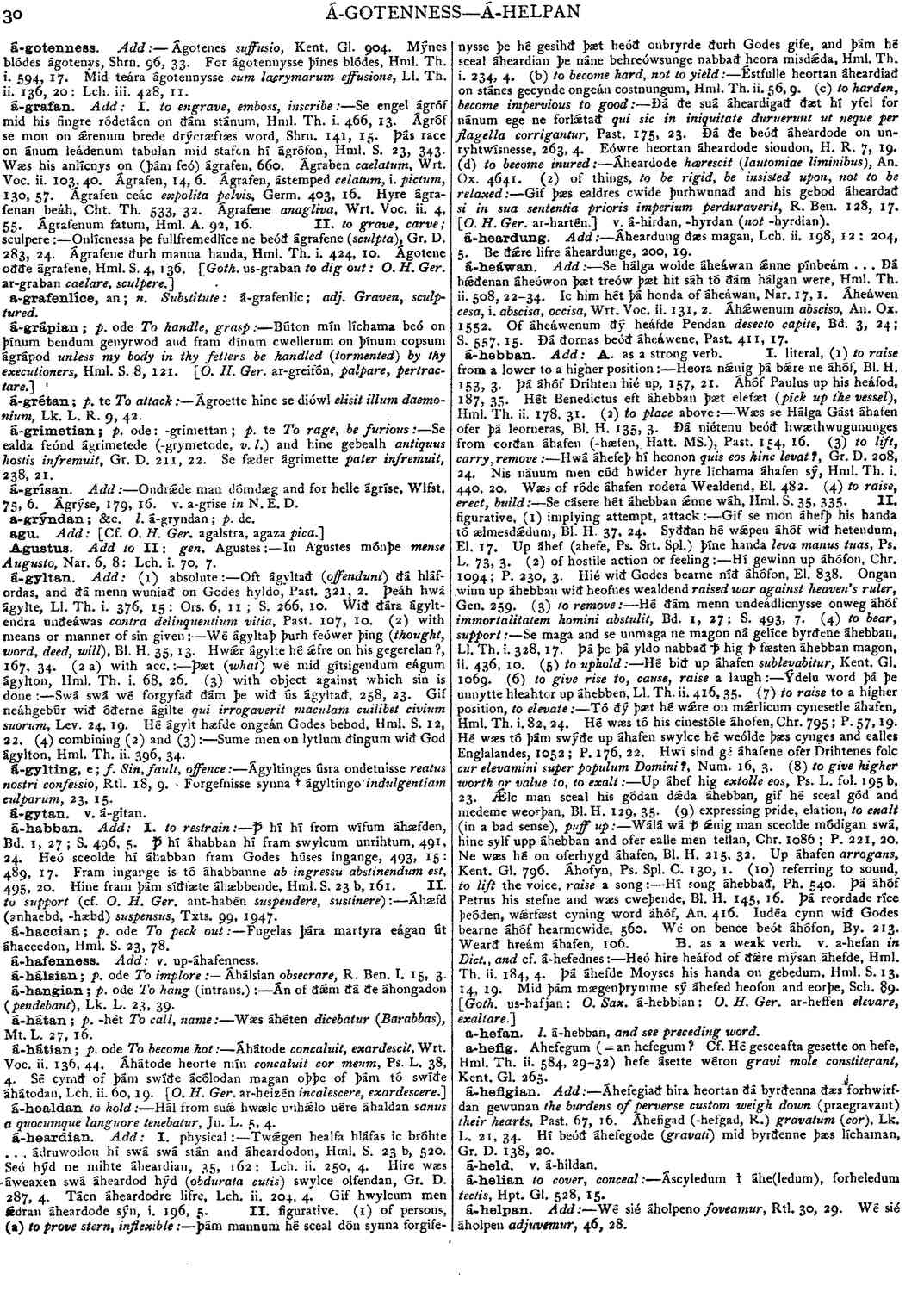á-hebban
- Heora nǽnig þá bǽre ne áhóf. Bl. H. 153. 3.
-
Þá áhóf Drihten hié up,
- 157, 21.
-
Áhóf Paulus up his heáfod,
- 187, 35.
-
Hét Benedictus eft áhebban þæt elefæt (
pick up the vessel
),- Hml, Th. ii. 178, 31.
-
Wæs se Hálga Gást áhafen ofer þá leorneras.
- Bl. H. 135, 3.
-
Ðá niétenu beóð hwæthwugununges from eorðan áhafen (-hæfen,
- Hatt. MS. ), Past. 154, 16.
-
Hwá áhefeþ hí heonon
quis eos hine levat?
,- Gr. D. 208, 24.
-
Nis nánum men cúð hwider hyre líchama áhafen sý,
- Hml. Th. i. 440, 20.
-
Wæs of róde áhafen rodera Wealdend,
- El. 482.
-
Se cásere hét áhebban ǽnne wáh,
- Hml. S. 35, 335.
-
Gif se mon áhefþ his handa tó ælmesdǽdum,
- Bl. H. 37, 24.
-
Syððan hé wǽpen áhóf wið hetendum,
- El. 17.
-
Up áhef (ahefe. Ps. Srt. Spl.) þíne handa
leva manus tuas
,- Ps. L. 73, 3.
-
Hí gewinn up áhófon,
- Chr. 1094; P. 230, 3.
-
Hié wið Godes bearne níð áhófon,
- El. 838.
-
Ongan winn up áhebban wið heofnes wealdend
raised war against heaven's ruler
,- Gen. 259.
-
Hé ðám menn undeádlicnysse onweg áhóf
immortalitatem homini abstulit
,- Bd. 1, 27; S. 493, 7.
-
Se maga and se unmaga ne magon ná gelíce byrðene áhebban,
- Ll. Th. i. 328, 17.
- Þá þe þá yldo nabbað ꝥ hig ꝥ fæsten áhebban magon, ii. 436, 10.
-
Hé bið up áhafen
sublevabitur
,- Kent. Gl. 1069.
-
Ýdelu word þá þe unnytte hleahtor up áhebben,
- Ll. Th. ii. 416, 35.
-
Tó ðý þæt hé wǽre on mǽrlicum cynesetle áhafen,
- Hml. Th. i. 82, 24.
-
Hé wæs tó his cinestóle áhofen,
- Chr. 795; P. 57, 19.
-
Hé wæs tó þám swýðe up áhafen swylce hé weólde þæs cynges and ealles Englalandes,
- 1052; P. 176, 22.
-
Hwí sind gé áhafene ofer Drihtenes folc
cur elevamini super populum Domini?
,- Num. 16, 3.
-
Up áhef hig
extolle eos
,- Ps. L. fol. 195 b, 23.
-
Ǽlc man sceal his gódan dǽda áhebban, gif hé sceal gód and medeme weorþan,
- Bl. H. 129, 35.
-
Wálá wá ꝥ ǽnig man sceolde módigan swá, hine sylf upp áhebban and ofer ealle men tellan,
- Chr. 1086; P. 221, 20.
-
Ne wæs hé on oferhygd áhafen,
- Bl. H. 215, 32.
-
Up áhafen
arrogans
,- Kent. Gl. 796.
-
Áhofyn, Ps. Spl. C. 130, 1. (10) referring to sound, to lift the voice,
raise
a song :-- Hí song áhebbað,- Ph. 540.
-
Þá áhóf Petrus his stefne and wæs cweþende,
- Bl. H. 145, 16.
-
Þá reordade ríce þeóden, wǽrfæst cyning word áhóf,
- An. 416.
-
We on bence beót áhófon,
- By. 213.
-
Wearð hreám áhafen, 106. B. as a weak verb. v. a-hefan
in Dict., and
cf. á-hefednes :-- Heó hire heáfod of ðǽre mýsan áhefde,- Hml. Th. ii. 184, 4.
-
Þá áhefde Moyses his handa on gebedum,
- Hml. S. 13, 14, 19.
-
Mid þám mægenþrymme sý áhefed heofon and eorþe,
- Sch. 89.
Bosworth, Joseph. “á-hebban.” In An Anglo-Saxon Dictionary Online, edited by Thomas Northcote Toller, Christ Sean, and Ondřej Tichy. Prague: Faculty of Arts, Charles University, 2014. https://bosworthtoller.com/38326.
Checked: 0